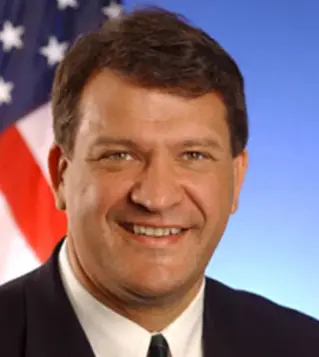Latimer easily defeats Astorino in county executive contest
[vsw id=”l_krujOId8w” source=”youtube” width=”650″ height=”440″ autoplay=”no”]William M. Mooney Jr. sensed something was up in the Westchester county executive election when he went to his White Plains polling place Tuesday morning. The parking lot was jammed and at 6:45 a.m., when typically three to five people would be voting, at least 75 were in line.
“That told me right away,” said Mooney, president of the Westchester County Association, “the race was over.”
His instinct bore out.

George Latimer, the Democrat state senator, easily defeated two-term incumbent Robert Astorino, the Republican, 116,767 votes to 89,463, according to unofficial election results.
Mooney was not surprised that Latimer won, in a county where far more Democrats than Republicans are registered. But he was surprised by the margin of victory.
Astorino had twice demonstrated that a Republican can win in off-year elections, if Democrats stay at home. He won easily in 2013, 56 to 44 percent, and in 2009, 57 to 43 percent.
The difference this year was the turnout.
More than 206,000 votes were cast. That”™s about 23,000 more votes than four years ago and 42,000 more than eight years ago. The increase in Democrat support was even more stark, about 36,000 more votes than 2013 and 46,000 more than 2009.
The 14 percent margin of victory, 57 percent for Latimer to 43 percent for Astorino, mirrors the results from 2003, another high turnout year. Astorino, the newcomer, lost that county executive contest to incumbent Andy Spano by 58 to 42 percent.
The question is, Why? Why did so many people go to the polls on a cold rainy day?
Antipathy to Donald Trump may have been a big factor.
“Westchester was a snapshot of what happened across the country last night,” said John Ravitz, executive vice president of The Business Council of Westchester.
“I think voters are concerned about the leadership in Washington, and they used last night as an opportunity to voice their protests,” Ravitz said.
Consumers and business people in Westchester and the Northeast in general, Mooney said, tend to be uncomfortable with the president”™s positions on taxes, Medicaid and health care.
Helen Schaub, political director of the 1199 SEIU health care union, also cited the Trump effect.
“There was a lot of pent-up energy around the results of last year”™s election and about people being concerned about what”™s happening nationally,” she said.
Mooney said union and Democrat opposition to a couple of ballot issues may have been an even greater factor than anti-Trump sentiment.
Schaub said one ballot issue, convening a state constitutional convention, did indeed motivate union members. They feared that a convention could put at risk constitutional articles that already protect collective bargaining, pensions and public health.
The proposed constitutional convention was defeated statewide and by an 81 to 19 percent majority in Westchester.
Ravitz said the business community expects to work with the new county executive to promote Westchester as a smart place for businesses to come and grow.
“For us, it has always been important to have a balanced county budget that protects our bond rating and doesn”™t have one-shots and fiscal gimmicks.”
Mooney said that the county”™s portion of property taxes, about 15 percent, leaves some room to address infrastructure.
“There have been eight years of not spending any money,” he said. “If you want to correct infrastructure and create a better business environment, you have to spend money. That”™s a healthy thing.”
The Business Council, said President Marsha Gordon in a news release, looks forward to partnering with Latimer to promote economic development and job creation.
Latimer pledged to partner with the two business organizations when interviewed by the Business Journal on election night.
He said his administration will be about more than controlling taxes. “It will be about jobs. It will be about housing. It will be about transportation. It will be about health care.”
He said economic development will focus not only on the Interstate 287 and Interstate 684 corridors, but on the inner cities.
“I think the business community is going to find that Democrat though I may be, they”™re going to have a sound, intelligent business partner in the county government.”